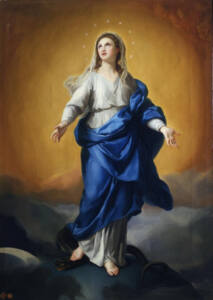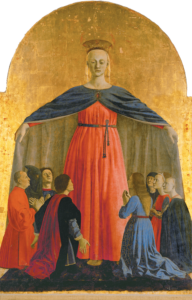WelCom December 2023
Fr James Lyons continues his exploration of titles given to the Blessed Virgin Mary in the 16th century Litany of Loretto.
Refuge of Sinners

In the 15th chapter of the Gospel of Luke there are three stories emphasising the unconditional love of God for creation. These ‘mercy parables’ tell of the shepherd who loses and finds his sheep [vs 4-7], the woman who loses and finds her coin [vs. 8-10], and the father who loses and finds his son [vs 11-32].
These parables tell us that nothing is outside the love of God. The animal world (sheep), the material world (coin), and the human world (son), have a significant place in God’s providence. It is not in God’s plan that anyone or anything should be lost. In the beginning, God saw all he had made and indeed it was very good [Genesis 1: 31].
The goodness in creation is often marred by the creature God loves most, the one made in God’s own image: the human person. Our negligence, our greed, our hatred, our jealousy, our wanting to be God, cause disharmony and disfigurement within and around us. This distortion of God’s work is sin, a turning away from God, claiming independence – I don’t need God! I know better than God!
Mary is our refuge. She comes among us as the purest of creatures, chosen as the mother of Jesus – the one who would save his people from their sins. Born of human parents, Mary is our sister in humanity. But as mother of Jesus, Son of God, Mary is also our stepping stone to God, and a shelter for those who slip, stumble or lose their way on the journey.
Mary, as Refuge of Sinners, knows the fear that can capture hearts as they encounter God. She echoes the assurance that consoled her, Do not be afraid [cf Luke 1: 30]and gathers us in safe sanctuary, encouraging us to take the next step, to keep going.
‘Mary, as Refuge of Sinners, knows the fear that can capture hearts as they encounter God. She echoes the assurance that consoled her, Do not be afraid [cf Luke 1: 30] and gathers us in safe sanctuary, encouraging us to take the next step, to keep going.’
Mary, as Refuge of Sinners, also knows the intensity of the love of God that ‘sent’ Jesus into the world to seek out and save what was lost [cf John 3: 16-17]. She is the welcoming home for pilgrims, providing rest and refreshment, reassurance, and a chance to regain strength for the way ahead.
In a meditation on the parable of the two sons [Luke 15: 11-32], Cardinal Maria Martini (Archbishop of Milan, 1980–2004 and a biblical scholar) notes that both sons had difficulty ‘living out the truth’ of their relationship with their father. ‘Both of them rejected it in one way or another. It took a long journey for the younger son to truly meet his father, whereas we do not know even today whether the elder made the journey himself.’ [Return to the Father, 1999, p 14.]
Mary is a refuge for each one of us as we ‘live out the truth’ of who we are on our journey home to the God who made us, and to whom we belong.
Mary, Refuge, Shelter.
Enclose us in your care.
Warm us away
from the cold winds of our selfishness.
Shield us from our fantasies and fears.
Heal us.
Strengthen us.
Renew us.
Turn our faces towards one another
|and set us more firmly
homeward.
Mary, Refuge of Sinners,
pray for us.
Solace of Migrants

Pope Francis added this new Marian title to the Litany of Loreto in June 2020. ‘May the Virgin Mary, Solacium Migrantium, “Solace or Comfort of Migrants”, help us discover the face of her Son in all our brothers and sisters who are forced to flee from their homeland because of the many injustices that still afflict our world today.’
By the end of 2022, reported the United Nations High Commission for Refugees, there were 108.4 million people displaced worldwide resulting from persecution, conflict or violation of human rights. This includes 35.3 million refugees and 62.5 million internally displaced people.
Migration means ‘a leaving behind’. There is also an expectancy, a looking beyond the here and now, a daring to hope for something better.
For migrants, there is an ending and a beginning and both are circled with uncertainty. Leaving the familiar without knowing exactly what lies ahead requires courage and preparedness, but these can be in short supply when it’s no longer safe to stay and getting out is the only option – and likely a very dangerous one.
Destinations for migrants, notably those with refugee status, are not necessarily of their choosing. Wherever they go, they face a new culture, a new language, a new way of seeing the world. Their host country may be ill-prepared for their arrival. Misunderstanding, prejudice, perhaps open hostility can be part of their ‘welcome’.
Vulnerable and desperate, migrants make easy prey for the unscrupulous.
Migrants have had to let go of much that was dear to them. Like a ship weighing anchor and setting sail, they leave the harbour they know so well and have to trust the open sea, exposed to all kinds of potential danger. ‘Have we done the right thing?’ ‘Will it work out ok?’ These and similar troubling questions travel with them.
‘Every person is a migrant, leaving each day behind, a traveller, a sojourner, moving through life. And none of us will find the destination on our own.’
Mary and Joseph were forced to flee their home to escape Herod’s jealous rage [see Matthew, Chapter 2]. They knew the pain of separation and abandonment of those forced to leave homeland, family and friends.
In his Act of Consecration to the Immaculate Heart of Mary (2022), Pope Francis echoes the cry of those suffering great loss and for whom hope and joy have become extremely fragile:
We now turn to you and knock at the door of your heart…. At this dark hour, help us and grant us your comfort. Say to us once more: ‘Am I not here, I who am your Mother?’ You are able to untie the knots of our hearts and of our times. In you we place our trust…. To preserve the joy of the wedding feast you said to Jesus: ‘They have no wine’ [John 2:3]. Now, O Mother, repeat those words and that prayer, for in our own day we have run out of the wine of hope, joy has fled, fraternity has faded….
As Solace or Comfort of Migrants, Our Lady is best placed to be their intercessor. But all of us have a part to play in ensuring migrants are welcomed, helped to feel at home, given every security and means to build their lives anew.
Every person is a migrant, leaving each day behind, a traveller, a sojourner, moving through life. And none of us will find the destination on our own.
There is no cause for
certainty in any life.
Migrants all
we travel with strangeness.
Courage counters caution
praying
hope will prevail.
A new dawn
bringing sight of a new home
with welcome meaning
more than welcome –
companionship rekindling joy
partnership and peace.
Togetherness
creating a touch more
certainty.
Mary, Solace of Migrants, pray for us.